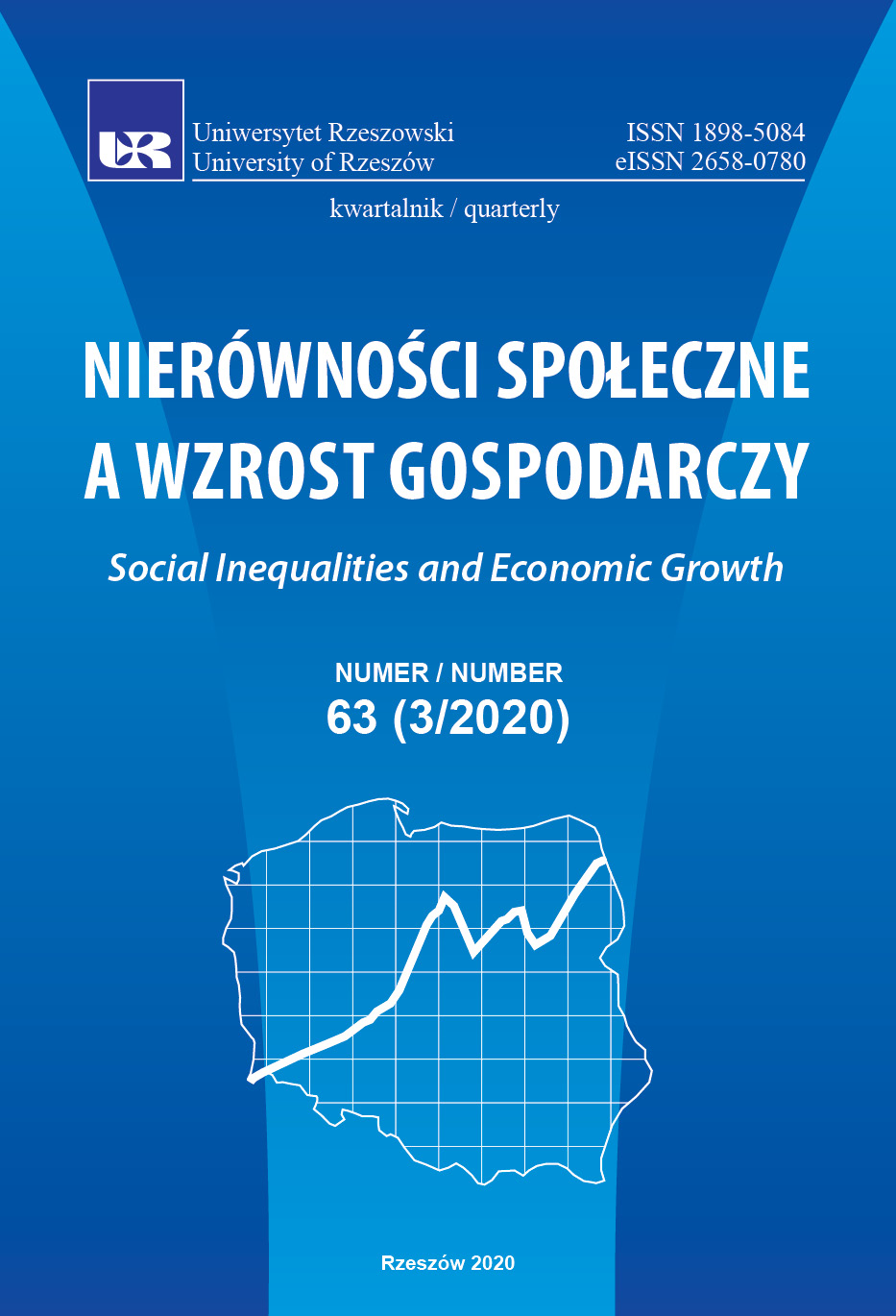Digital technological platforms – an opportunity or a threat to quality work?
DOI:
https://doi.org/10.15584/nsawg.2020.3.12Keywords:
gig economy, cybertariat, workAbstract
Digital technological platforms that facilitate the provision of many services are a relatively new development in the economy, especially in the labour market. As they are becoming increasingly prevalent, the characteristics of this business model are gradually revealed. The model creates many novel ways to make goods available and generate income, but it also translates into a new quality of work. In the discussion of the labour market segment operating based on technological platforms, the world literature tends to employ the concepts of the gig economy and cybertariat, which are unequivocally negative in their connotations.
The paper discusses the relationship between technological innovations and work. It aims to determine the characteristics of work carried out through digital technological platforms in the cross-section of the major dimensions of quality work. The paper presents the verification of the research hypothesis assuming that the business model adopted by digital technological platforms threatens the standards of quality work. The analysis uses the methodology designed by the author and employs the criteria developed by the European Anti-Poverty Network, constituting the quintessence of the contemporary approach to the issue in the European Union. Its main conclusion is that the gig economy segment is highly heterogeneous, which makes it difficult to assess and discuss the problems arising in this segment and their solutions. In consequence, it requires a clarification through adequate classifications and identification of problem groups. However, the research results reveal that a significant part of the gig economy generates very low quality work.
Downloads
References
Bejinaru, R. (2019). Impact of Digitalization on Education in the Knowledge Economy. Management Dynamics in the Knowledge Economy, 7(3), 367–380. DOI: 10.25019/MDKE/7.3.06.
Berg, J., Furrer, M., Harmon, E., Rani, U., Silberman, M. (2018). Digital labour platforms and the future of work. Toward decent work in the online world. Geneva: ILO.
Bogenhold, D., Klinglmair, R., Kandutsch, F. (2017). Solo-Self-Employment, human capital and hybrid labour in the gig economy. Foresight and STI Governance, 4, 23–32.
Bratianu, C., Hadad, S., Bejinaru, R. (2020). Paradigm shift in business education: a competence-based approach. Sustainability, 12(4), 1348. DOI: 10.3390/su12041348.
De Stefano, V. (2016). The rise of the “just-in-time workforce”: On demand work and the labor protection in the” gig economy. Geneva: ILO.
EAPN (2011). 10 principles on quality work. Retrieved from: https://www.eapn.eu/quality-work-for-quality-life-eapn-s-10-principles/ (2019.07.20).
ETUI. Job Quality Index. Retrieved from: https://www.etui.org/Topics/Labour-market-employment-social-policy/Job-quality-index-JQI (2019.07.19).
Graham, M., Hjorth, I., Lehdonvirta, V. (2017). Digital labour and development: impacts of global digital labour platforms and the gig economy on worker livelihoods. Transfer, 23(2), 135–162. DOI: 10.1177/1024258916687250.
Hunt, A., Samman, E. (2019). Gender and the gig economy. Critical steps for evidence-based policy. ODI Working Paper 546.
ILO. Decent work. Retrieved from: https://www.ilo.org/global/topics/decent-work/lang-en/index.htm (2019.07.19).
Kessler, S. (2018). Gigged: the end of the job and the future of work. New York: St. Martin’s Press.
Kuhn, K. M. (2016). The Rise of the “Gig Economy” and Implications for Understanding Work and Workers. Industrial and Organizational Psychology, 9(1), 157–162. DOI: 10.1017/iop.2015.129.
Lepanjuuri, K., Wishart, R., Cornick, P. (2018). The characteristics of Those in the gig economy. Department for Business, Energy & Industrial Strategy. Final report.
Leschke, J., Watt, A. (2008). Job quality in Europe. Brussels: European Trade Union Institute for Research, Education and Health and Safety.
Merkel, J. (2019). Freelance isn’t free. Co-working as a critical urban practice to cope with informality in creative labour markets. Urban Studies, 56(3), 526–547. DOI: 10.1177/0042098018782374.
Minter, K. (2017). Negotiating labour standards in the gig economy: Airtasker and Unions New South Wales. The Economic and Labor Relations Review, 28(3), 438–454. DOI: 10.1177/1035304617724305.
Neamtu, D., Hapenciuc, V., Bejinaru, R. (2019). The Impact of Digitalization on Business Sector Development in the Knowledge Economy. Proceedings of the International Conference on Business Excellence 2019, Bucharest, Romania, 13(1), 479–491. DOI: 10.2478/picbe-2019-0042.
Ostoj, I. (2019). The growth of the gig economy – benefits and treats to labor. Economic and Social Development. 41st International Scientific Conference on Economic and Social Development Book of Proceedings, 23–24 May 2019, Belgrade, 386–394.
Prassl, J. (2018). Humans as a service. Oxford: Oxford University Press.
Schwellnus, C., Geva, A., Pak, M., Veil, R. (2019). Gig economy platforms: boon or bane? Economic Department Working Papers No. 1550. Geneva: OECD.
Spreitzer, G. M., Cameron, L., Garrett, L. (2017). Alternative Work Arrangements: Two Images of the New World of Work. Annual Review of Organizational Psychology and Organizational Behavior, 4, 473–499. DOI: 10.1146/annurev-orgpsych-032516-113332.
Stanford, J. (2017). The resurgence of gig work: Historical and theoretical perspective. The Economic and Labor Relations Review, 28(3), 382–401. DOI: 10.1177/ 1035304617724303.
Stewart, A., Stanford, J. (2017). Regulating work in the gig economy: What are the options? The Economic and Labor Relations Review, 28(3), 420–437. DOI: 10.1177/ 1035304617722461.
Tassinari, A., Maccarrone, V. (2017). The mobilization of gig economy couriers in Italy: some lessons for the trade union movement. Transfer, 23(3), 353–357. DOI: 10.1177/1024258917713846.
Todoli-Signes, A. (2017). The „gig economy”: employee, self-employed or the need for a special employment regulation? Transfer, 23(2), 1–13. DOI: 10.1177/1024258917701381.
Wood, A. J., Graham, G., Lehdonvirta, V., Hjorth, I. (2019). Good Gig, Bad Gig: Autonomy and Alghorithmic Control in the Global Gig Economy. Work, Employment and Society, 33(1), 56–75. DOI: 10.1177/0950017018785616.
Downloads
Published
How to Cite
Issue
Section
License
Copyright (c) 2020 University of Rzeszow

This work is licensed under a Creative Commons Attribution-ShareAlike 4.0 International License.


